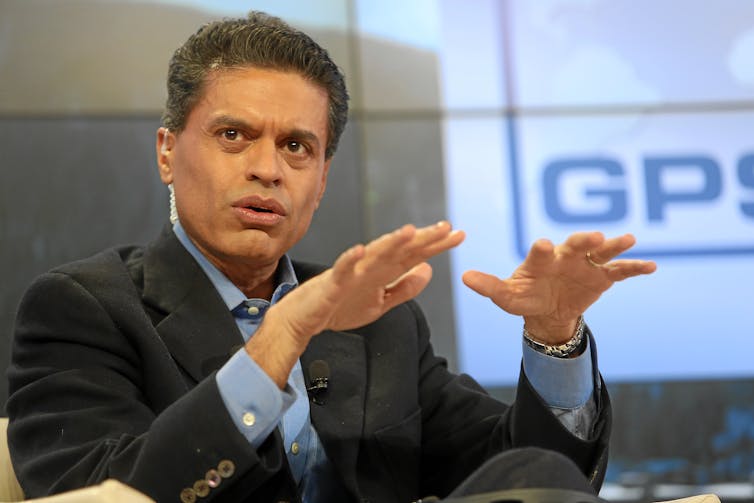
Representational Image
January 28, 2015 11.55pm GMT
Andina Dwifatma, Universitas Katolik Indonesia Atma Jaya
In the public eye, an expert, writing for newspapers and magazines or speaking on television, used to be considered almost infallible. The public rarely challenged their words and considered their analysis trustworthy. Not anymore.
Thanks to the internet, access to books, articles and journals enables people to examine the validity of any information. With blogs and social media, the audience are no longer mere passive receivers of information but are also producers. Using the internet, common people, without official credentials and sometimes with ridiculous pseudonyms, are challenging the authority of experts on knowledge.
Bloggers catch plagiarising pundits
Two bloggers who run a website, Our Bad Media, recently accused Newsweek’s high-profile columnist Fareed Zakaria of multiple acts of plagiarism. For months, the bloggers – under pseudonyms @blippoblappo and @crushingbort – carefully compared Zakaria’s writing with other articles and found multiple similarities. From their exposé, it seemed that Zakaria has been applying the art of cut-and-paste and replacing words with synonyms.
Our Bad Media’s accusation comes two years after Zakaria was found to have plagiarised New Yorker writer Jill Lepore’s reports on gun control. The Washington Post and Slate now append warnings for readers on Zakaria’s pieces.

A similar case occurred in Indonesia. In February 2014, a blogger writing in a citizens’ media forum, Kompasiana, pointed out that Universitas Gadjah Mada economist Anggito Abimanyu plagiarised an article on disaster insurance written by former State Insurance Company P.T. Jamsostek director Hotbonar Sinaga.
Abimanyu copied large parts of Sinaga’s piece, published in 2006 in Indonesia’s largest daily Kompas, for his article in the same newspaper. Abimanyu resigned after the plagiarism scandal surfaced.
Anyone can be an expert
Being published in the media sometimes provides commentators with “expert” status even if they lack expertise on the subject matter being discussed and have no relevant research on the topic. Many media organisations work by the economic principle: they aim to produce news fast and cheap. Reporters often keep contacting the same old individuals, since searching for new ones requires more time and effort.
In the 1990s, communication scholars Dan D. Nimmo and James E. Combs highlighted how democracy had shifted into punditocracy. Citizens in a punditocracy are mere voyeurs of knowledge. Instead of discussing the problems they face together, they watch the pundits debate about what is considered important. The grassroots become alienated from their own real issues.
It’s different today. Cyberspace allows anyone – even those with pseudonymous accounts – to gain status as experts without having to appear in conventional media, so long as they consistently provide relevant information.
On the microblogging site Twitter, some Indonesian users likes to give “lectures”. Indonesians call this activity “Kultwit” – a contraction of kuliah (lecture) and Twitter. Twitter users would post a themed and usually numbered series of tweets. Anyone with a twitter account can give these twitter lectures.
This is an inevitable part of communication technology development. The internet’s low barrier to entry makes it possible for anyone to broadcast anything. According to the Association of Indonesia Internet Service Providers (APJII), Indonesia had no fewer than 71.19 million internet users in 2013, up 12% in a year.
In accordance with the MDGs, internet users in Indonesia should reach 107 million in 2014, and 139 million users in 2015. Globally, there were 2.9 billion internet users by July 2014, according to the International Telecommunication Union (ITU).
In an increasingly open and connected world, no-one can be called an expert in absolute terms. The new media provide a new and more egalitarian platform for public debate. There is a spirit to interrogate any information from any source, including those in a position of authority such as state officials, politicians or social commentators in the media.
The best way is to let the quality of the writing speak for itself. Is the analysis sharp? Are the sources credible? Is the language clear? These are things to look out for in digesting information.
The easier it is for us to access information, the more careful and critical we should be when selecting and processing it.
Andina Dwifatma, Lecturer in the School of Communication, Universitas Katolik Indonesia Atma Jaya
This article is republished from The Conversation under a Creative Commons license
Sign up for the QuackTrack.org newsletter below!













